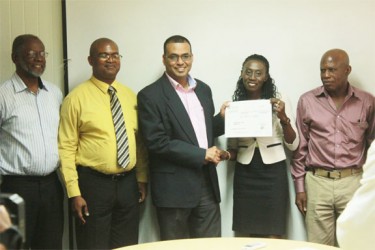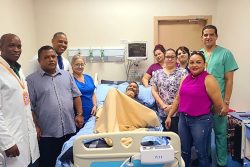To assist Guyana in attaining its objective for mercury-free mining, the World Wide Fund for Nature (WWF) yesterday donated US$60,000 or $12 million to facilitate training and awareness to the Ministry of Natural Resources and the Environment (MNRE).
However, while the MNRE welcomed the grant, Minister of Natural Resources Robert Persaud explained that it’s a gradual process and he did not foresee a ban on mercury mining until possibly another ten years’ time.
“This will support and supplement what they are doing. At this point and time we are working towards a gradual reduction in the use of mercury presence in the mining sector we don’t believe that we can afford to have an immediate and total ban,” Persaud said.
Mercury is widely used here in the amalgamating of gold and poses serious health risks if not properly used. Bans on its trade have been instituted by the US and the European Union. Local miners have pleaded with the government to ensure that they will still have access to mercury.

At the signing of the grant agreement, held in the MNRE’s Boardroom, WWF’s Country Manager Dr Patrick Williams informed that his organisation’s collaboration with the MNRE was part of its global sensitisation process on the dangers of mercury and to ultimately rid the country of mercury in mining.
He explained that the monies donated would go towards a three-fold project. “One will look at training for miners and new entrants into the mining sector, the second… focuses on an attempt to upgrade the codes of practice…, the third component issues relating to the distribution of mercury within Guyana…and is expected to last for one year,” he said.
The Natural Resources Minister explained that the issue of mercury-free mining is one that is high on his ministry’s agenda and that currently plans are being implemented as it pertains to policies when mining. “The issue at hand
is certainly very critical, in terms of how do we better manage the environmental issues associated with the mining sector and particularly looking at the subject of the use of mercury…its focus and a direction we are heading in and that’s a policy direction…to better improve the mining sector,” said Persaud.
Further, he explained that while miners are being encouraged to seek alternatives, plans are being worked out to offer incentives for those who opt for this. As such there are active consultations with stakeholders to determine strategies that can work best for this country. “We don’t want the situation when we talk about mining it conjures up the images of disruption and bad practices…we all recognise that we have to do a better job and it is because of this recognition and partnering with organisations… that will make us address some of those weaknesses,” he said.
Representing the Guyana Gold and Diamond Miners Association, an organisation that covers a large percentage of this country’s small miners, was William Woolford. He underscored the importance of the role that the GGMC plays in not only edifying the miners on the benefits of mercury-free mining but that they should be the support base for instructions and training on the use of the new technology. The reason being, he stated, was that while the new technology yields tremendous benefits the complexity of the equipment can prove to be a hindrance for the miners. He stated that Guyana would also have to have readily available distributors of the mercury-free mining equipment as is currently the case with mercury.





